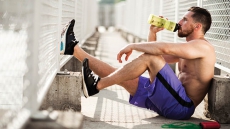Many of us know how important vitamin D levels are to our overall health and that we get most of our intake through outdoor summer sun UVB exposure. But what can we do in the winter when outdoor UVB is unavailable at our Canadian latitude? Here are some practical ways to make sure you are not vitamin D deficient this winter:
1. Test your vitamin D level – The only way to know if you are vitamin D deficient is through a 25(OH)D blood test. This can be prescribed by your doctor and there may be a fee involved. Another option would be to purchase a home blood test kit through an organization like GrassrootsHealth. Either way, make sure you get your test score and compare it to the level recommended by over 50 vitamin D scientists of 100-150 nmol/L. If you are not within this ideal level, adjust your intake either up or down, using some of the options below, and re-test again after 3 months since it takes some time to bring the levels up.
2. Take a trip south – Approximately 90% of our vitamin D is produced in our skin with UVB light from the sun. There is nothing better than getting away to a sunny destination and soaking up some rays. To produce vitamin D in your skin the location needs to be below 35° N latitude or roughly below Atlanta, GA. Vitamin D is best produced at midday when the sun is high in the sky with the UV index above 3 and your shadow shorter than your height. Consider acclimatizing your skin before going south so you don’t burn as easily. Remember, sunscreen applied properly reduces your vitamin D production by up to 95+%. Try getting some sun exposure for vitamin D first and then applying sunscreen to make sure you do not burn.
3. Use a sunbed – Artificially produced UVB can be a surrogate for sunlight in winter. Make sure you use a facility that has a trained operator controlling the equipment. A study I co-authored in 2010 showed that indoor tanners have some of the highest vitamin D levels in Canada. A photon of light is a photon of light whether from the sun or produced in a sunbed. For people with malabsorption issues, such as those with inflammatory bowel disease (IBD), who cannot absorb vitamin D from food or supplements, this would be their only option in the winter. Remember to use protective goggles and consider reducing the suggested session time by 50% and have at least 48 hours between sessions. There is an increased risk of skin cancer from UV overexposure whether from outdoor sun or sunbed exposure and caution needs to be taken. Know your skin, and skin type. Do not burn!
4. Supplement with Vitamin D3 – Supplements throughout the winter are the next best option to UVB exposure. However, understand that vitamin D supplements do not provide all the beneficial photo products that the sun or UV produces. The key with vitamin D3 supplements is that you need to take enough to be comparable to what you would make in the summer sun. For most adults that would be up to 4,000 IU per day. Vitamin D3 supplements are safe, easy to find and inexpensive.
5. Eat more vitamin D rich foods – Food sources overall do not contain much vitamin D but can help contribute a small amount to your 4,000 IU daily intake. Oily fish such as wild salmon are one of the best food sources and contain up to 500 IU per serving. Milk is fortified and contains 100 IU/cup. Other sources to consider include mushrooms and egg yolks.
Dr. Gerry Schwalfenberg M.D. is an Assistant Clinical Professor, Department of Family Practice, University of Alberta, Edmonton, AB. and also has a family medical practice.






